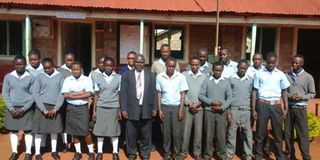No mean feat for school in Embu after student scores first ever C+ in KCSE exam

Kithunguthia Day Secondary School Principal Benson Njagi in the school compound with Form Four students. The school is still in a celebratory mood after the top student in the 2014 KCSE exam scored a C+, the first in the history of the school. PHOTO | CHARLES WANYORO | NATION MEDIA GROUP
What you need to know:
- Though it was ranked the last in the county in the 2013 exams, it improved in the 2014 KCSE examinations.
- The school is basking in the glory of attaining a mean score of 3.4 while the top student was feted by fellow students, teachers and even the community at large, as a pacesetter.
- The principal, Mr Benson Njagi, says they were disturbed by the dismal performance in 2013 where they managed a mean score of 2.4762.
- When the Nation visited the school this week, there was an aura of optimism in the school with a population of 135 students and six teachers.
For many schools, having the top student in KCSE score a C+ grade may not be seen as a big achievement.
But for the students and teachers of Kithunguthia Secondary School, it was joy and ululation when a student scored C+ in the 2014 KCSE exam.
Long after the 2014 Kenya Certificate of Secondary Education (KCSE) exam results were announced, a secondary school in Embu County whose top candidate scored a C+ is still in a celebratory mood.
Kithunguthia, which was ranked last in the county in the 2013 exams, improved in the 2014 KCSE examinations.
The school is basking in the glory of attaining a mean score of 3.42806 while the top student was feted by fellow students, teachers and even the community at large, as a pacesetter.
In the exam three students got C-, five got D+, eight got D and five got D- which was a marked improvement and success in the painful journey the school undertook after it was ranked at the bottom in the county in the 2013 KCSE exam.
The principal Mr Benson Njagi says they were disturbed by the dismal performance in 2013 where they managed a mean score of 2.4762, with one student getting a C-, two got D+, four got D, while 13 got D- with one getting an E. They vowed that would never happen again.
When the Nation visited the school this week, there was an aura of optimism in the school with a population of 135 students and six teachers.
SCHOOL LACKS ADEQUATE FACILITIES
The school lacks adequate infrastructure but the students and teachers go about their day’s duties with a clear sense of focus written on their faces.
Mr Njagi said they are on a trajectory journey to recovery and target to score a mean grade of at least 4 points in the 2015 KCSE exam.
“When we ranked last in the county, all stakeholders met and resolved we would never be at the bottom of the pack again. We started bench-marking with other schools, improved on discipline and invited motivational speakers,” he says.
He says the efforts paid off immediately after some focused students started arriving in school as early as 5am so that they could be at par with those in boarding schools where facilities are better and staff adequate.
Mr Njagi who joined the school in 2010 says the school has been grappling with discipline issues since inception in 2002 due to instability brought about by infighting on who was to head it.
“In 2012 we decided to confront the issue head on but in 2013 there was a strike because the school had no Chemistry and Biology teachers and the one employed by the board had left. This contributed to poor performance,” he recalls.
ENCOURAGED STUDENTS
He says in 2014 they involved the teachers, the school’s board and even national government coordinators and agreed students must be encouraged and given the best environment to study.
Mr Njagi reveals most of the parents are quite poor and though the school charges fees of less than Sh10,000 per student annually, only about 70 per cent manage to pay after struggling to get the money.
He says the perception of free secondary education has made some parents to neglect their duty of paying school fees, with some not even bothered to apply for bursaries.
CHRONIC ABSENTEEISM
He adds that truancy and chronic absenteeism is also a challenge as students refuse to attend school so as to work on miraa farms while others remain at home for long when sent to bring fees.
“The parents are unwilling to support school projects. Some are even unable to bring some maize and sorghum to prepare lunch for the students yet this area is agriculturally productive. We are working to change their attitude,” he says.
He says there is a shortage of three teachers especially in science subjects and also a shortage of furniture.
Mr Njagi, however, thanks the Runyenjes CDF for building the school laboratory, among other infrastructure, and the government for providing textbooks and revision materials.
This is after the institution made some improvement after being ranked last in the previous exams.





